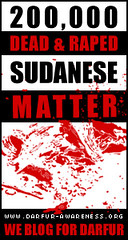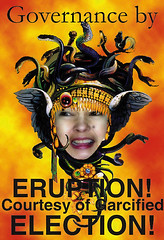Post-Election Thoughts
Bottom Line
By Marvin Bionat
The march of history is ultimately about liberation and empowerment: the freeing of slaves, the political empowerment of women, the desegregation of races, the decolonization of nations, the overthrow of tyrants. And the election of the first black US president marks another significant milestone in that uplifting narrative of humanity's progress.
Obama's victory is a euphoric denouement to a long and often vicious election season, especially for those who actively helped in his campaign and who knew all along that they were part of a historic drama that saw the weak overcoming the strong: a political neophyte who started with virtually nothing, but somehow out-thought, out-organized, and even out-spent formidable political machines, first of the Clintons and then of the mighty Republican Party.
While Obama's victory suggests a more color-blind America, the election results reveal segments of the electorate that are most resistant to progressive change. For sure it's a long way from the era of segregation and anti-miscegenation laws; America is not quite there yet.
If only white people voted, McCain would have won handily with 55% of the votes vs. Obama's 43%. Obama's weakest support was among whites who don't have a college education: he trailed McCain by a whopping 18 points. Among elderly voters (65 and up), Obama was 8 points behind. That McCain garnered 46% of the overall popular vote (vs. Obama's 52%) despite the deep financial crisis and the almost completely bungled 8-year Bush/Republican administration was a testament to America's still significant resistance to progressive politics.
What more than made up for Obama's political deficit among less educated and elderly white voters was his core constituency: young voters and minority groups. He handily garnered 66% of voters aged 18 to 29 and a remarkable, albeit not too surprising, 95% of the black vote. Among Hispanics, 66% favored Obama, perhaps partly because the Clintons (whose network of Latino supporters runs deep and wide) ultimately went all-out for him during the final dash to the finish. Among Asians, a strong 63% sided with the Democratic candidate.
There were concerns that Obama might not do well among Catholics, because conservative priests were exhorting parishioners to reject candidates who did not oppose Roe v. Wade, but he actually received 54% of the Catholic vote. Among Filipino-Americans, a largely Catholic voting bloc, a pre-election survey of community leaders (conducted by the National Federation of Filipino-American Associations and the Federation of Philippine-American Chambers of Commerce) showed Obama trumping McCain 58 to 42. A good chunk or 34%, of the Filipino-Americans surveyed were still undecided a few weeks before the elections, but since most of them were Hillary Clinton supporters, a more spirited endorsement of Obama by the New York senator and by Bill Clinton toward the end of the campaign probably helped sway voters to join the Obama bandwagon.
Obama has tremendous political capital to work with, but the gravity of America's economic, military, and social problems will quickly threaten to dissipate all the goodwill. However, if Obama's sterling performance in the presidential campaign was any indication, he'll probably do well managing the high-wire acts that politics will inevitably require him to perform. Besides, Americans know the stakes are very high: if the next president bungles the job as bad as the last, the US will continue its downward spiral, directly hitting Americans where it hurts most — their pocketbooks.
It is therefore to America's best interest to give the new president the extra latitude and support he needs. That, and Obama's thoughtful leadership will provide hope that the US will somehow extricate itself from the current quagmire.
************************************************************************
 Marvin Bionat is the creator of PhilippineUpdate.com, a news and views site that has served as a virtual platform that promotes various advocacies, including the political empowerment of overseas Filipinos and accountability in government. He wrote the National Bookstore bestseller How to Win (or Lose) in Philippine Elections (Anvil Publishing, 1998) and is now based in the
Marvin Bionat is the creator of PhilippineUpdate.com, a news and views site that has served as a virtual platform that promotes various advocacies, including the political empowerment of overseas Filipinos and accountability in government. He wrote the National Bookstore bestseller How to Win (or Lose) in Philippine Elections (Anvil Publishing, 1998) and is now based in the U.S.
By Marvin Bionat
The march of history is ultimately about liberation and empowerment: the freeing of slaves, the political empowerment of women, the desegregation of races, the decolonization of nations, the overthrow of tyrants. And the election of the first black US president marks another significant milestone in that uplifting narrative of humanity's progress.
Obama's victory is a euphoric denouement to a long and often vicious election season, especially for those who actively helped in his campaign and who knew all along that they were part of a historic drama that saw the weak overcoming the strong: a political neophyte who started with virtually nothing, but somehow out-thought, out-organized, and even out-spent formidable political machines, first of the Clintons and then of the mighty Republican Party.
While Obama's victory suggests a more color-blind America, the election results reveal segments of the electorate that are most resistant to progressive change. For sure it's a long way from the era of segregation and anti-miscegenation laws; America is not quite there yet.
If only white people voted, McCain would have won handily with 55% of the votes vs. Obama's 43%. Obama's weakest support was among whites who don't have a college education: he trailed McCain by a whopping 18 points. Among elderly voters (65 and up), Obama was 8 points behind. That McCain garnered 46% of the overall popular vote (vs. Obama's 52%) despite the deep financial crisis and the almost completely bungled 8-year Bush/Republican administration was a testament to America's still significant resistance to progressive politics.
What more than made up for Obama's political deficit among less educated and elderly white voters was his core constituency: young voters and minority groups. He handily garnered 66% of voters aged 18 to 29 and a remarkable, albeit not too surprising, 95% of the black vote. Among Hispanics, 66% favored Obama, perhaps partly because the Clintons (whose network of Latino supporters runs deep and wide) ultimately went all-out for him during the final dash to the finish. Among Asians, a strong 63% sided with the Democratic candidate.
There were concerns that Obama might not do well among Catholics, because conservative priests were exhorting parishioners to reject candidates who did not oppose Roe v. Wade, but he actually received 54% of the Catholic vote. Among Filipino-Americans, a largely Catholic voting bloc, a pre-election survey of community leaders (conducted by the National Federation of Filipino-American Associations and the Federation of Philippine-American Chambers of Commerce) showed Obama trumping McCain 58 to 42. A good chunk or 34%, of the Filipino-Americans surveyed were still undecided a few weeks before the elections, but since most of them were Hillary Clinton supporters, a more spirited endorsement of Obama by the New York senator and by Bill Clinton toward the end of the campaign probably helped sway voters to join the Obama bandwagon.
Obama has tremendous political capital to work with, but the gravity of America's economic, military, and social problems will quickly threaten to dissipate all the goodwill. However, if Obama's sterling performance in the presidential campaign was any indication, he'll probably do well managing the high-wire acts that politics will inevitably require him to perform. Besides, Americans know the stakes are very high: if the next president bungles the job as bad as the last, the US will continue its downward spiral, directly hitting Americans where it hurts most — their pocketbooks.
It is therefore to America's best interest to give the new president the extra latitude and support he needs. That, and Obama's thoughtful leadership will provide hope that the US will somehow extricate itself from the current quagmire.
************************************************************************
 Marvin Bionat is the creator of PhilippineUpdate.com, a news and views site that has served as a virtual platform that promotes various advocacies, including the political empowerment of overseas Filipinos and accountability in government. He wrote the National Bookstore bestseller How to Win (or Lose) in Philippine Elections (Anvil Publishing, 1998) and is now based in the
Marvin Bionat is the creator of PhilippineUpdate.com, a news and views site that has served as a virtual platform that promotes various advocacies, including the political empowerment of overseas Filipinos and accountability in government. He wrote the National Bookstore bestseller How to Win (or Lose) in Philippine Elections (Anvil Publishing, 1998) and is now based in the Other articles from the author:
- Single-Issue Catholics
- Scapegoating Minorities
- Who am I? Why am I here?
- Round 1: Obama
- Staying above the cesspool of lies and deceit

POGB will not sell, exchange, use or allow any 3rd party access to your email for
any other purposes without exception, email exclusively for article updates only.
























1 Speak Out:
"My mother read to me years ago
That all men are created equal,
All are endowed by their Creator
With certain unalienable rights,
Life, Liberty & the pursuit of Happiness.
We have a faith in simple dreams,
An insistence on small miracles.
We can tuck in our children at night
And know that they are fed and clothed
And safe from harm.
That we can say what we think,
Write what we think,
Without hearing a sudden knock on the door.
That we can participate in the political process
Without fear of retribution!"
Barack Obama
Post a Comment